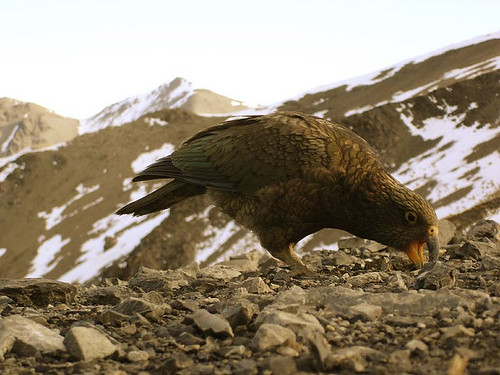 Kea (Nestor notabilis)High country farmers are being urged not to break the law to stop a protected bird preying on their livestock.
Kea (Nestor notabilis)High country farmers are being urged not to break the law to stop a protected bird preying on their livestock.
The kea, known for its intelligence and inquisitive nature, is turning to live sheep for food, which can result in a slow and miserable death for the sheep.
Until 1986, farmers could protect stock by shooting a rogue kea, but the birds are now an endangered and protected species, so such an act could result in prosecution.
Federated Farmers high country spokesman Donald Aubrey said kea attacks were a long known hazard for high-country farmers.
"They target the area around a sheep's kidneys," Mr Aubrey said. "They do that by riding on the back of the sheep and pecking around the spinal region.
"From my observation, the number of incidents involving kea has reduced. Unfortunately where there is an isolated outbreak, it can at times be quite severe."
Ross Ivey, who farms the 20,000ha Glentanner Station near Mt Cook National Park, accepts the occasional loss of livestock to kea is "something we have to live with".
A few days ago one of his sheep died of blood poisoning after a kea pecked through its skin and ate a kidney.
"A lot of people think the problem with keas finished years ago and that's not the case."
Department of Conservation spokesman Andrew Grant said the kea was an opportunist, doing what it had to to survive in the harsh high country.
Measures had to be taken to protect stock without hastening the kea's decline. For farmers brought up on shooting problem keas, it was a "learning process".
Mr Grant said DoC was prepared to work with farmers to deal with rogue birds.
This could mean capturing and relocating them. But Mr Ivey said tracking the birds spread over a station the size of his was a long shot, and even then there was a good chance they would find their way back.
Mr Aubrey said the present situation where farmers negotiated with DoC over rogue kea seemed to be adequate.
"But if we get into a situation that the farmer is suffering losses ... we would need to revisit it."
THE KEA
* The kea is the only alpine parrot species and is found only in the high country of the South Island.
* It is considered perhaps the most intelligent bird species in the world.
* The Department of Conservation says it is impossible to estimate the number in the wild, but the Kea Conservation Trust believes it is 1000 to 5000.